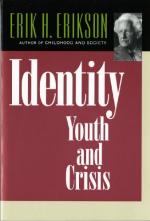
|
| Name: _________________________ | Period: ___________________ |
This test consists of 15 multiple choice questions and 5 short answer questions.
Multiple Choice Questions
1. During the process of Erikson's stages of identity development, what will depend on the total process of identity development?
(a) Environment.
(b) Self.
(c) Psychosocial strength.
(d) Biology.
2. What was William James obsessed with his entire life?
(a) Identity.
(b) Self.
(c) Social dysfunction.
(d) Morbid psychology.
3. What does it mean when the author states, "to review the concept of identity"?
(a) Sketch its history.
(b) Give a lecture.
(c) Write an outline.
(d) Disprove identity.
4. In developing Erikson' theory of group identity, what two processes must the ego consist of that assist in defining both body in community membership?
(a) Social and mental.
(b) Spiritual and social.
(c) Spiritual and biological.
(d) Biological and social.
5. What does Erikson state is the first age of identity development involve in terms of conflict?
(a) Initiative vs. Guilt.
(b) Autonomy vs. shame.
(c) Trust vs. mistrust.
(d) Intimacy vs. isolation.
6. What type of self is clear when examining Freud's dreams?
(a) Open-minded self.
(b) Identified self.
(c) Suppressed self.
(d) Confident self.
7. What does Freud's consciousness of inner identity include?
(a) Conflict.
(b) Bitter pride.
(c) Love.
(d) Peace.
8. What does Erikson suggest wholeness of the individual is associated with?
(a) The earth.
(b) Totalitarianism.
(c) Equilibrium and health.
(d) Positive psychology.
9. According to Erikson, what is the third stage of development?
(a) Autonomy vs. shame.
(b) Intimacy vs. isolation.
(c) Initiative vs. guilt.
(d) Trust vs. mistrust.
10. What style of identity combines medieval conception of community with modern disobedience and nonviolence?
(a) Individual.
(b) Peacenik.
(c) Conformity.
(d) Anarchy.
11. According to Freud, what is the first stage of identity development called?
(a) Phallic stage.
(b) Latent stage.
(c) Oral stage.
(d) Anal stage.
12. According to Erikson, what is the second stage of identity development?
(a) Intimacy vs. isolation.
(b) Initiative vs. Guilt.
(c) Autonomy vs. shame.
(d) Trust vs. mistrust.
13. What is one example that Erikson provides for the notion of "evil ego identity"?
(a) Confusion.
(b) Gender stereotypes.
(c) Self loathing.
(d) Ethnic stereotypes.
14. What is the core part of identity formation that cannot be separated from this formation?
(a) Individuality.
(b) Collectivism.
(c) Peace of mind.
(d) Authority acceptance.
15. What is unique about each stage of Erikson's stages of identity development?
(a) They are flexible.
(b) They are concrete.
(c) The build on one another.
(d) Conflict.
Short Answer Questions
1. Why was Erikson so impressed with Shaw?
2. Erikson states that we deal with the process located in the core of the individual and where else?
3. That does introjection mean in terms of Erikson's stages of identity development for groups other than the majority?
4. What might gaining a stronger self identity correspond to in relation to the majority of the population?
5. What does Erikson feel happens when a healthy personality deals with conflict?
|
This section contains 477 words (approx. 2 pages at 300 words per page) |

|




